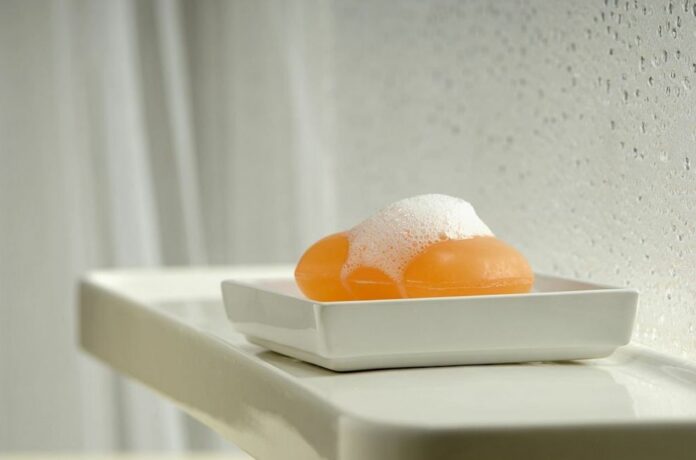The Secret to Repelling Mosquitoes: Researchers Find Certain Soaps are More Effective Than Others
Could Washing with the Wrong Soap Attract More Mosquitoes? A new study published today reveals how different soaps affect your attractiveness to mosquitoes.
According to a recent study published in the journal iScience, researchers from Virginia Tech have discovered that the type of soap you use can impact your attractiveness to mosquitoes.
Some soaps were found to attract mosquitoes, while others were found to be repellent.
However, the effects of the soaps varied among individuals due to the interactions between the soaps and each person’s unique odor profile. This sheds light on the ongoing debate about why some people are more prone to mosquito bites than others.
“It’s remarkable that the same individual that is extremely attractive to mosquitoes when they are unwashed can be turned even more attractive to mosquitoes with one soap, and then become repellent or repulsive to mosquitoes with another soap,” remarks senior author and neuroethologist Clément Vinauger.
For centuries, humans have been using various perfumed personal products including soaps. While we know that these products can alter our perception of body odor, it remains uncertain whether they also impact how mosquitoes perceive us as potential blood donors. Mosquitoes primarily feed on plant nectar, so using scents derived from plants or mimicking their scent could potentially confuse their ability to differentiate between a food source.
To investigate the potential relationship between soap application and mosquito attraction, researchers studied the chemical odors emitted by four human volunteers. The volunteers were characterized both when unwashed and after washing themselves with four different soap brands- Dial, Dove, Native, and Simple Truth. Additionally, the researchers analyzed the odor profiles of the soaps themselves.
According to the research team, every participant had their own distinct odor profile, with certain individuals being more appealing to mosquitoes than others. Furthermore, the application of different soaps considerably altered these odor profiles, not only by incorporating floral scents into the mix.
“Everybody smells different, even after the application of soap; your physiological status, the way you live, what you eat, and the places you go all affect the way you smell,” adds co-author and biologist Chloé Lahondère. “And soaps drastically change the way we smell, not only by adding chemicals, but also by causing variations in the emission of compounds that we are already naturally producing.”
In the next phase of the study, the researchers assessed the effect of soap application on the attractiveness of human volunteers to Aedes aegypti mosquitoes. They compared the volunteers’ attractiveness to mosquitoes when they were unwashed versus one hour after washing with one of four different soaps. To ensure the accuracy of the results, the researchers only tested the attractiveness for adult female mosquitoes who had recently mated and excluded the effects of exhaled carbon dioxide (CO2), a known mosquito cue, by using fabric that had absorbed the human volunteer’s odors for the trials.
The findings revealed that washing with different soaps had varying impacts on mosquitoes’ preferences, with the size and direction of impact differing between soap types and human volunteers. While washing with Dove and Simple Truth increased the attractiveness of some volunteers, washing with Native soap tended to repel mosquitoes.
“What really matters to the mosquito is not the most abundant chemical, but rather the specific associations and combinations of chemicals, not only from the soap, but also from our personal body odors,” points out Vinauger. “All of the soaps contained a chemical called limonene which is a known mosquito repellent, but in spite of that being the main chemical in all four soaps, three out of the four soaps we tested increased mosquitoes’ attraction.”
“We know that ratios of chemicals are extremely important for determining whether mosquitoes are attracted or repelled,” adds Lahondère. “Changing the ratio of the same exact chemicals can result in attraction, indifference, or repulsion.”
In order to pinpoint the ingredients that have the ability to attract or repel mosquitoes, the research team conducted an analysis of the chemical compositions of various soaps and how they affected mosquito preference. Through this analysis, the researchers were able to identify four chemicals that attract mosquitoes and three chemicals that repel them. These chemicals included a coconut-scented chemical commonly found in American Bourbon and a floral compound utilized in the treatment of scabies and lice. To further test the efficacy of these chemicals, the team combined them to create odor blends that either attracted or repelled mosquitoes. These odor blends demonstrated significant impacts on mosquito preference.
“With these mixtures, we eliminated all the noise in the signal by only including those chemicals that the statistics were telling us are important for attraction or repulsion,” adds Vinauger. “I would choose a coconut-scented soap if I wanted to reduce mosquito attraction.”
The researchers aim to further investigate and broaden their findings by conducting additional testing with a larger sample size of individuals and a greater variety of soap products. Additionally, they plan to investigate the long-term impact of soap on mosquito preference.
“We’re very curious to look at the time course of this effect—so for example, if you take a shower in the morning, does it still matter to mosquitoes in the evening?” adds Vinauger.
Image Credit: Getty
